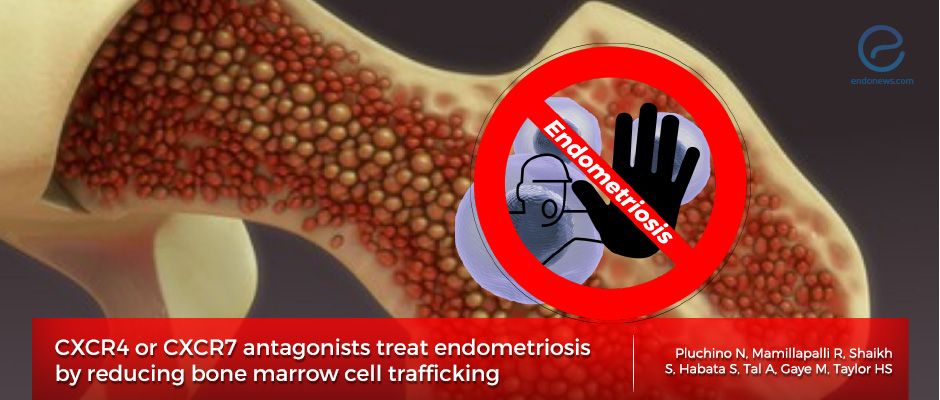CXCR4 or CXCR7 antagonists as novel therapies for endometriosis
Jan 21, 2020
Blocking CXCR4 and CXCR7 reduces engraftment of bone marrow-derived stem cells into the endometriosis
Key Points
Highlight:
- Dr. Taylor's group suggests that CXCR4 and CXCR7 antagonists are promising non-hormonal therapies for endometriosis.
Importance:
- Bone marrow-derived stem cells (BMDCs) are involved in the pathogenesis of endometriosis.
- BMDCs are stimulated by chemokines such as C-X-C motif chemokine ligand 12 (CXCL12) and expand or mobilize.
- CXCL12 and its receptors, CXCR4 and CXCR7, are highly increased in the endometriosis tissue and suggested as crucial signals for BMDCs migration to endometriosis.
- Thus, inhibiting CXCL12-CXCR4 or CXCR7 may reduce the growth of endometriosis.
Key points:
- In a mouse bone marrow transplantation model, bone marrow-derived cells engrafting endometriosis expressed CXCR4 and CXCR7.
- Pharmacological antagonists of CXCR4 or CXCR7 reduced the engrafting of BMDSCs into endometriosis.
- The size of endometriosis lesions significantly reduced after the treatment with antagonists.
- Significant drug efficacy was observed even in well-established endometriosis closely mimicking human endometriosis.
- This effect was not observed in human primary endometrial cells.
Conclusions:
- Dr. Taylor's group showed that inhibition of the CXCL12-CXCR4-CXCR7 axis reduced BMDCs recruitment and endometriosis lesions.
- They suggest that CXCR4 and CXCR7 antagonists are promising novel therapies for endometriosis.
- However, the specificity of these treatments has not been evaluated, so further studies focusing on the side effects are highly required.
Lay Summary
Endometriosis is a common, estrogen-dependent chronic inflammatory disorder. It affects approximately 5-10% of reproductive-aged women and 20-50% of infertile women. Endometriosis also has a significant social and psychological impact on the lives of women. Despite such a significant burden, there is no endometriosis-specific treatment available.
Bone marrow-derived stem cells (BMDCs) are shown to be involved in the pathogenesis of endometriosis by contributing regeneration and vascularization at the endometriotic lesions. In cancer and/or inflammation conditions, BMDCs get stimulated by chemokines and expand or mobilize. One of the well-known chemokines is C-X-C motif chemokine ligand 12 (CXCL12) and it has been reported to enhance proliferation, vasculogenesis, and angiogenesis. Therefore, the development of chemokine blocking agents is actively investigating and several clinical trials are vigorously ongoing.
Recently, several groups reported that CXCL12 and its receptors, CXCR4 and CXCR7, are highly increased in the endometriosis tissue. CXCL12/CXCR4/CXCR7 axis is also suggested as crucial signals for BMDCs migration to endometriosis. Given this current understanding, Dr. Taylor's group from Yale School of Medicine hypothesized that inhibiting CXCL12-CXCR4 or CXCR7 may reduce the growth of endometriosis significantly. This study was recently published in the “Journal of Cellular and Molecular Medicine”.
Firstly, they confirmed that bone marrow-derived cells engrafting endometriosis express CXCR4 and CXCR7. Then, they tested whether the pharmacological antagonists of CXCR4 or CXCR7 reduces the engrafting of BMDSCs into endometriosis. For this, small molecules CCX771 and AMD3100 were applied to block CXCR7 and CRCR4 respectively. After treatment with these antagonist small molecules, they found that the presence of the BMDCs in murine endometriosis was significantly reduced suggesting CXCL12/CXCR4/CXCR7 axis is critical for endometriosis implants.
To test their clinical application, the size of endometriosis lesion was monitored after the treatment of AMD3100 or CCX771. Compared to the control, the treated groups reduced about 50% of the lesion volume at day 15. Both treatments also reduced vessel density by 40%. Next, to closely mimic human endometriosis condition, they tested the drug efficacy in recipient mice with established endometriosis. Not surprisingly, both AMD3100 and CCX771 reduced endometriosis lesion volume by 60%, and cell proliferation by 70% of the pre-existing lesions. Interestingly, this effect was not observed in human primary endometrial cells. And this supports that the effects of AMD3100 are specific to BMDCs, not normal endometrial cells.
In conclusion, Dr. Taylor's group showed that inhibition of the CXCL12-CXCR4-CXCR7 axis reduced BMDCs recruitment and endometriosis lesions. They suggest that CXCR4 and CXCR7 antagonists are promising novel therapies for endometriosis. However, the specificity of these treatments has not been evaluated in these studies, so further studies focusing on the side effects are highly required.
Research Source: https://www.ncbi.nlm.nih.gov/pubmed/31904910
AMD3100 BMDSC bone marrow-derived stem cells CCX771 CXCR4 CXCR7 Endometriosis

